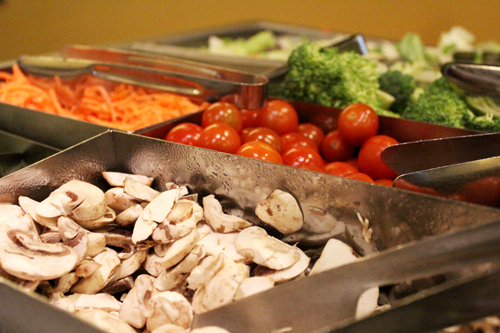Aramark, the official provider of catering and dining services for PSU since 2007, is contractually obligated to purchase 30 percent of its food from local sources and to increase this percentage by 2 percent each year. But because the company had neglected to send its quarterly reports to the Campus Sustainability Office since September 2011—and because the office had not answered the Vanguard’s request for records from the periods before then—it is hard to say exactly how much local food is being served on campus.
Is Aramark’s food local?
It is hard to say how much local food is being served on campus, because its sole food provider, Aramark, has not been supplying the required reports.
Aramark has been the official provider of catering and dining services for Portland State since 2007. Aramark’s contract with PSU states that 30 percent of its purchases must be locally sourced food, increasing by 2 percent each year. Quarterly reports detailing the purchases are to be sent to the Campus Sustainability Office.

No reports have been received by the sustainability office since September 2011. Reports requested by the Vanguard for the periods before then have not been supplied by the office.
According to both Aramark and the PSU administration, the issue has been overlooked for nearly a year because of administrative turnover in both the sustainability office and at Aramark. Aramark has had three directors in the last year, but PSU Sustainability Coordinator Jenny McNamara has been in place since October 2011.
McNamara said in an email that Aramark was “complying, but due to some turnover in Aramark leadership and the sustainability office, there was a temporary lag in compliance.
“We are back on track now,” she said. “It’s a priority for this year.
“I think there is potential to increase our local purchasing, and we are working with Aramark to evaluate these possibilities,” she continued.
McNamara could not locate any of the pre-2011 purchasing reports by press time.
The contract between PSU and Aramark defines local food as being grown and processed in the Northwest, including Oregon, Washington, Idaho and Northern California. The contract breaks the food down into very specific categories and requires that certain percentages be local.
For example, the contract requires that 30 percent of fruits and vegetables, 50 percent of beef, 50 percent of flour and 100 percent of milk and dairy be local.
Tim Kellen has been Aramark’s director for four months. He said that the other directors simply “weren’t here long enough to get [the sustainability reports] started.”
In addition to the 10-month gap in reporting, Kellen said that some parts of the contract’s local food stipulations are impossible to fulfill.
For example, Kellen said there is no locally sourced flour supplier where Aramark can purchase 50 percent of its supply. “WinCo has it,” he said, “but as much as we need, they can’t provide it. It’s not feasible.”
In response to inquiries made by the Vanguard, a brief sustainability report was produced by Aramark on July 25 saying that 51 percent of purchases are local. It states that out of its purchases, everything but beef and poultry is being purchased at compliant levels.
Kellen said that 31 percent of total sales are local, and the difference arises because PSU deducts purchases that cannot conceivably be local, such as coffee. With the 2 percent increase in purchasing every year, 40 percent of Aramark’s purchases should be local.
Kellen said Aramark is in the process of meeting with the university to get its sustainability reporting up to compliance, and that this part of the contract will be rewritten this year to make it more feasible. In addition, Aramark plans to hire a sustainability coordinator this fall to focus on these issues.
Stacey Sobell, manager of local non-profit Ecotrust’s Farm to School initiative, disagreed with Kellen’s statement that some of the local requirements in the contract would be impossible to fulfill. “Our region offers an abundance of foods at affordable prices. Given that PSU’s definition of local includes four states, it should not be difficult for Aramark to fulfill the minimum annual local foods procurement terms of their contract.”
Comparatively, Portland Public Schools is able to source about a third of its food from the Northwest on $1.25 per child, Sobell said.
“I think PSU is on the right track with their food purchasing guidelines, but it seems with the current representation from Aramark there are a lot of missed opportunities to implement them,” she said
Joey Magill, a member of PSU’s Food For Thought co-op, explained that even in their small operation, it is hard to quantify what percentage of food is local because it varies seasonally and can be difficult to measure.
“Whenever possible, we source from Oregon,” he said. “Then Washington, then California.” He explained that a lot of food items commonly consumed just aren’t local, such as coffee.







If some of the contract stipulations “just aren’t feasible” maybe they should have thought about that before signing the contract